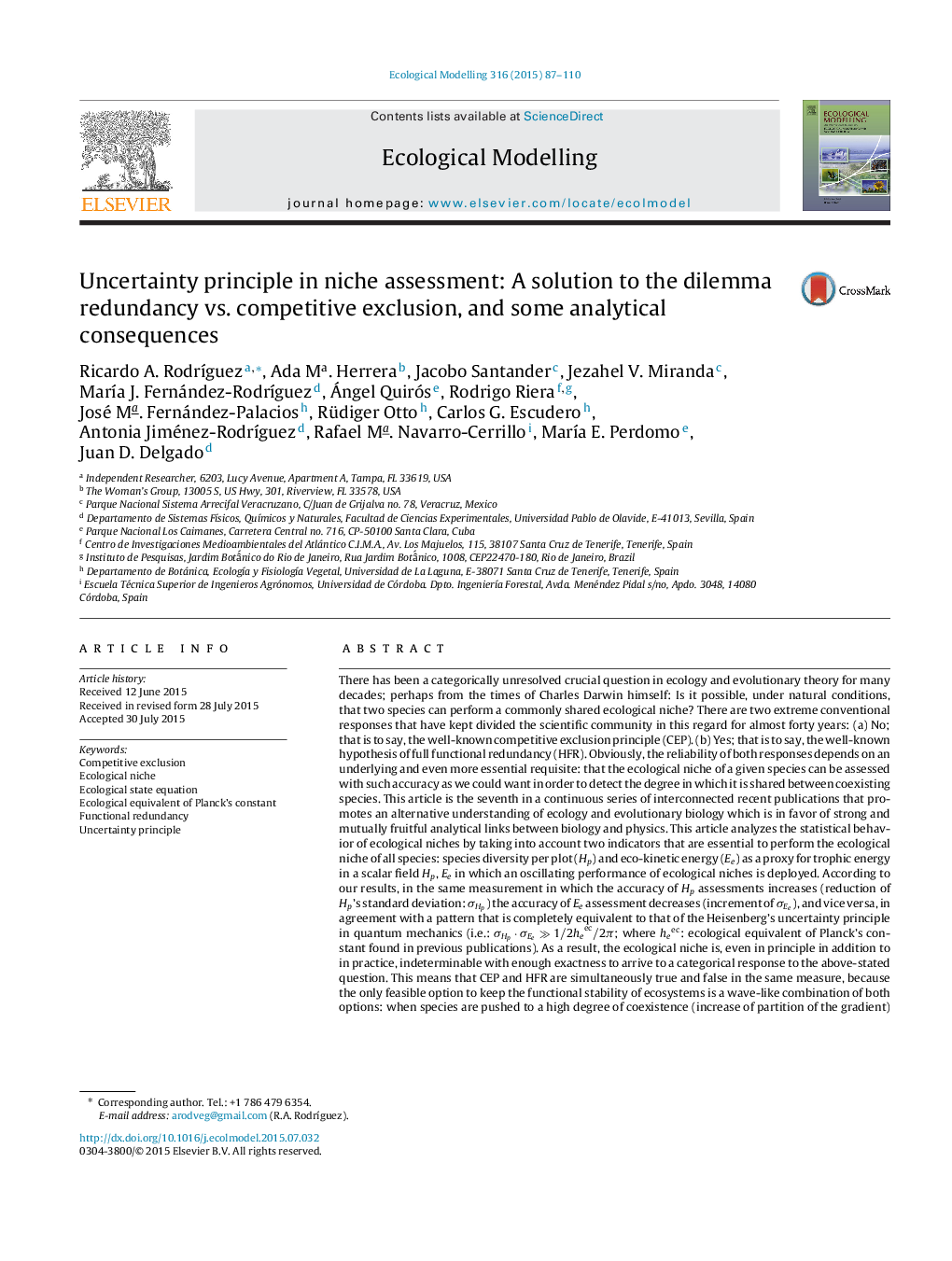| کد مقاله | کد نشریه | سال انتشار | مقاله انگلیسی | نسخه تمام متن |
|---|---|---|---|---|
| 6296461 | 1617431 | 2015 | 24 صفحه PDF | دانلود رایگان |
عنوان انگلیسی مقاله ISI
Uncertainty principle in niche assessment: A solution to the dilemma redundancy vs. competitive exclusion, and some analytical consequences
ترجمه فارسی عنوان
اصل عدم قطعیت در ارزیابی طرز تفکر: راه حلی برای انعطاف پذیری معضل در مقابل انحصار رقابتی و برخی از پیامدهای تحلیلی
دانلود مقاله + سفارش ترجمه
دانلود مقاله ISI انگلیسی
رایگان برای ایرانیان
کلمات کلیدی
محرومیت رقابتی، طاقچه اکولوژیکی، معادله حالت اکولوژیکی، معادل اکولوژیکی ثابت پلانک، کارکرد اضافی، اصل عدم قطعیت،
موضوعات مرتبط
علوم زیستی و بیوفناوری
علوم کشاورزی و بیولوژیک
بوم شناسی، تکامل، رفتار و سامانه شناسی
چکیده انگلیسی
There has been a categorically unresolved crucial question in ecology and evolutionary theory for many decades; perhaps from the times of Charles Darwin himself: Is it possible, under natural conditions, that two species can perform a commonly shared ecological niche? There are two extreme conventional responses that have kept divided the scientific community in this regard for almost forty years: (a) No; that is to say, the well-known competitive exclusion principle (CEP). (b) Yes; that is to say, the well-known hypothesis of full functional redundancy (HFR). Obviously, the reliability of both responses depends on an underlying and even more essential requisite: that the ecological niche of a given species can be assessed with such accuracy as we could want in order to detect the degree in which it is shared between coexisting species. This article is the seventh in a continuous series of interconnected recent publications that promotes an alternative understanding of ecology and evolutionary biology which is in favor of strong and mutually fruitful analytical links between biology and physics. This article analyzes the statistical behavior of ecological niches by taking into account two indicators that are essential to perform the ecological niche of all species: species diversity per plot (Hp) and eco-kinetic energy (Ee) as a proxy for trophic energy in a scalar field Hp, Ee in which an oscillating performance of ecological niches is deployed. According to our results, in the same measurement in which the accuracy of Hp assessments increases (reduction of Hp's standard deviation: ÏHp) the accuracy of Ee assessment decreases (increment of ÏEe), and vice versa, in agreement with a pattern that is completely equivalent to that of the Heisenberg's uncertainty principle in quantum mechanics (i.e.: ÏHpâ
ÏEeâ«1/2heec/2Ï; where heec: ecological equivalent of Planck's constant found in previous publications). As a result, the ecological niche is, even in principle in addition to in practice, indeterminable with enough exactness to arrive to a categorical response to the above-stated question. This means that CEP and HFR are simultaneously true and false in the same measure, because the only feasible option to keep the functional stability of ecosystems is a wave-like combination of both options: when species are pushed to a high degree of coexistence (increase of partition of the gradient) in regard to Hp values (a trend in favor of HFR), their degree of coexistence in regard to Ee values diminishes (decrease of partition of the Ee gradient, a trend in favor of CEP), and vice versa. The final sections of the article highlight the eco-evolutionary, biogeographical and socio-economic meaning of this result, by offering plausible alternative explanations to a wide spectrum of phenomena that appear to be only partially understood so far, e.g.: the contradictory results about the relationship between body size, species diversity and macroevolutionary rates; the general environmental scenario in favor of macroevolutionary leaps with a low probability to leave footprints in the fossil record; the unnecessary, although stimulant, influence of geographic isolation to promote evolutionary changes; the island rule; and the general meaning of the interaction between nature and society.
ناشر
Database: Elsevier - ScienceDirect (ساینس دایرکت)
Journal: Ecological Modelling - Volume 316, 24 November 2015, Pages 87-110
Journal: Ecological Modelling - Volume 316, 24 November 2015, Pages 87-110
نویسندگان
Ricardo A. RodrÃguez, Ada Ma. Herrera, Jacobo Santander, Jezahel V. Miranda, MarÃa J. Fernández-RodrÃguez, Ángel Quirós, Rodrigo Riera, José Mª. Fernández-Palacios, Rüdiger Otto, Carlos G. Escudero, Antonia Jiménez-RodrÃguez,
